- Home
- Tony Hillerman
A Thief of Time Page 15
A Thief of Time Read online
Page 15
“Leaphorn thinks she went. Or, I think he does.”
“Now,” Nakai said, “I earned my ride.”
Chee took him to a hogan built on the slope of a wash that drained into Gothic Creek—using three-quarters of an hour to cover less than eight jarring miles. It was almost full dark when they pulled onto the slick rock surface that formed the hogan yard, but the moon was bright enough to show why the site had been picked. A growth of cottonwoods, tamarisks, and rabbitbrush at the lip of the wash showed where a spring flowed. It was probably the only live water within thirty miles, Chee guessed, and it wasn’t lively enough to support a family in the dry season. A row of rusty water barrels on a wooden rack told him that. Chee parked, raced the pickup engine to make sure the hogan’s occupants had noticed their arrival, and turned off the engine. A dim light, probably from a kerosene lamp, showed through the side window. The smell of sheep, a smell that always provoked nostalgia in Chee, drifted down from a brush compound behind the house.
“You have another little problem now,” Chee said.
“What?”
“This brother of yours who lives here. He steals pots for you. You want to tell him about Etcitty, and Nails, and Houk. You want to tell him to be careful—that somebody’s shooting pot hunters. But I’m a cop so you don’t want me to hear it.”
Nakai said nothing.
“No car. No truck. At least I don’t see one. Or see any place to put one on this flat rock where I couldn’t see it. So somebody who lives here has gone off with the truck.”
Nakai said nothing. He drew in a breath and exhaled it.
“So if I just leave you here, as you’d intended, then you’re stuck. No gas and no ride to where you can get some.”
“One of his sons probably has the truck,” Nakai said. “He probably keeps some gasoline here somewhere. At least a five-gallon can.”
“In which case you walk that eight miles back to the Caddy with it,” Chee said. “Or maybe he doesn’t have any gas.”
A blanket hanging over the hogan doorway swung aside. The shape of a man appeared, looking out at them.
“What do you have in mind?” Nakai said.
“You quit playing the game. I’m not going to arrest anyone for stealing pots. But I gotta find out where they came from. That’s all I care about. If you don’t know where that is, this Paiute Clan man here does. Let him tell me. No more games.”
The Paiute Clan man was called Amos Whistler. A skinny man with four of his lower front teeth missing. He knew where the pots had come from. “Way over there, toward the west. Toward Navajo Mountain,” he said, indicating the direction. “Maybe thirty miles across the Nokaito Bench.” But there were no roads, just broken country, sandstone cut by one wash after another. Whistler said he had heard about the ruins years ago from an uncle, who told him to stay out of the place because the ghosts were bad in there. But he had learned about Jesus, and he didn’t believe in ghosts, so he packed in with a couple of horses, but it was tough going. An ordeal. He’d lost a horse. A good one.
Chee owned an excellent U.S. Geological Survey map of the Big Reservation, a book in which each page showed everything in a thirty-two-mile square. “What’s the name of the canyon?”
“I don’t know if it has a name,” Amos Whistler said. “Around here they say its name is Canyon Where Watersprinkler Plays His Flute.” It was a long name in Navajo, and Whistler looked embarrassed when he said it.
“Would you take me in there? Rent the horses and lead me in?”
“No,” Amos Whistler said. “I don’t go there no more.”
“I’d hire you,” Chee said. “Pay you for using your horses. Good money.”
“No,” Whistler said. “I’m a Christian now. I know about Jesus. I don’t worry about Anasazi ghosts like I did when I was a pagan. Before I walked on the Jesus Road. But I won’t go into that place.”
“Good money,” Chee said. “No problems with the law.”
“I heard him in there,” Whistler said. He took two steps away from Chee, toward the hogan door. “I heard the Watersprinkler playing his flute.”
FOURTEEN
LEAPHORN MANAGED a forward seat by the window when he changed planes in Chicago. There was nothing to see—just the topside of solid cloud cover over the great flat, fertile American heartland. Leaphorn looked down at this gray mass and thought of the river of wet air flowing up from the Gulf of Mexico, and of cold rain, and bleak, featureless landscapes closed in by a sky no more than six feet above one’s forehead. At least Emma had saved them from that by holding him on the reservation.
He was depressed. He had done what he had gone to do and achieved nothing useful. All he knew that he hadn’t known before was that Etcitty had been too smart to sign a pot documentation admitting a violation of federal law. Leaphorn was fairly sure that the physical description of the site must be accurate. He could think of no reason for Etcitty to have made up such a complicated description. It seemed to flow from memory. An unsophisticated man following the form’s instructions, describing reality with the single lie to avoid incrimination. That helped very little. The Utah–Arizona–New Mexico border country was a maze of washes, gulches, draws, and canyons. Thousands of them, and in their sheltered, sun-facing alcoves, literally scores of thousands of Anasazi sites. He’d seen an estimate of more than a hundred thousand such sites on the Colorado Plateau, built over a period of almost a thousand years. What Etcitty had given him was like a description of a house in a big city with no idea of its street address. He could narrow it down some. Probably in southern Utah or extreme northern Arizona. Probably north of Monument Valley. Probably east of Nokaito Mesa. Probably west of Montezuma Creek. That narrowed it to an area bigger than Connecticut, occupied by maybe five thousand humans. And all he had was a site description that might be as false as its location obviously was.
Perhaps Chee had done better. An odd young man, Chee. Smart, apparently. Alert. But slightly…slightly what? Bent? Not exactly. It wasn’t just the business of trying to be a medicine man—a following utterly incongruous with police work. He was a romantic, Leaphorn decided. That was it. A man who followed dreams. The sort who would have joined that Paiute shaman who invented the ghost dance and the vision of white men withering away and the buffalo coming back to the plains. Maybe that wasn’t fair. It was more that Chee seemed to think an island of 180,000 Navajos could live the old way in a white ocean. Perhaps 20,000 of them could, if they were happy on mutton, cactus, and piñon nuts. Not practical. Navajos had to compete in the real world. The Navajo Way didn’t teach competition. Far from it.
But Chee, odd as he was, would find Slick Nakai. Another dreamer, Nakai. Leaphorn shifted in the narrow seat, trying vainly for comfort. Chee would find Nakai and Chee would get from Nakai about as much information as Leaphorn would have been able to extract.
Leaphorn found himself thinking of what he would say to Emma about Chee. He shook his head, picked up a New Yorker, and read. Dinner came. His seatmate examined it scornfully. To Leaphorn, who had been eating his own cooking, it tasted great. They were crossing the Texas panhandle now. Below, the clouds were thinning, breaking into patches. Ahead, the earth rose like a rocky island out of the ocean of humid air that blanketed the midlands. Leaphorn could see the broken mesas of eastern New Mexico. Beyond, on the western horizon, great cloud-castle thunderheads, unusual in autumn, rose into the stratosphere. Leaphorn felt something he hadn’t felt since Emma’s death. He felt a kind of joy.
Something like that mood was with him when he awoke the next morning in his bed at Window Rock—a feeling of being alive, and healthy, and interested. He was still weary. The flight from Albuquerque to Gallup in the little Aspen Airways Cessna, and the drive from Gallup, had finished what reserves he had left. But the depression was gone. He cooked bacon for breakfast and ate it with toast and jelly. While he was eating the telephone rang.
Jim Chee, he thought. Who else would be calling him?
It was Corporal El
lison Billy, who handled things that needed handling for Major Nez, who was more or less Leaphorn’s boss.
“There’s a Utah cop here looking for you,” Billy said. “You available?”
Leaphorn was surprised. “What’s he want? And what kind of cop?”
“Utah State Police. Criminal Investigation Division,” Billy said. “He just said he wants to talk to you. About a homicide investigation. That’s all I know. Probably told the major more. You coming in?”
Homicide, he thought. The depression sagged down around him again. Someone had found Eleanor Friedman-Bernal’s body. “Tell him ten minutes,” he said, which was the time it took for him to drive from his house among the piñons on the high side of Window Rock to police headquarters beside the Fort Defiance Highway.
The desk had two messages for him. One from Jim Chee was short: “Found Nakai near Mexican Hat with a friend who says ruins is located in what the locals call Watersprinkler Canyon west of his place. I will stay reachable through the Shiprock dispatcher.”
The other, from the Utah State Police, was shorter. It said: “Call Detective McGee re: Houk. Urgent.”
“Houk?” Leaphorn said. “Any more details?”
“That’s it,” the dispatcher said. “Just call McGee about Houk. Urgent.”
He put the message in his pocket.
The door to the major’s office was open. Ronald Nez was standing behind his desk. A man wearing a blue windbreaker and a billed cap with the legend LIMBER ROPE on the crown sat against the wall. He got up when Leaphorn walked in, a tall man, middle-aged, with a thin, bony face. Acne or some other scarring disease had left cheeks and forehead pocked with a hundred small craters. Nez introduced them. Carl McGee was the name. He had not waited for a call back.
“I’ll get right to it,” McGee said. “We got a homicide case, and he left you a note.”
Leaphorn kept his face from showing his surprise. It wasn’t Friedman-Bernal.
McGee waited for a response.
Leaphorn nodded.
“Harrison Houk,” McGee said. “I imagine you know him?”
Leaphorn nodded again, his mind processing this. Who would kill Houk? Why? He could see an answer to the second question. And in general terms to the first one. The same person who had killed Etcitty, and Nails, and for the same reason. But what was that?
“What was the message?”
McGee looked at Major Nez, who looked back, expression neutral. Then at Leaphorn. This conversation was not going as McGee had intended. He extracted a leather folder from his hip pocket, took a business card from it, and handed it to Leaphorn.
BLANDING PUMPS
Well Drilling, Casing, Pulling
General Water System Maintenance
(We also fix your Septic Tanks)
The card was bent, dirty. Leaphorn guessed it had been damp. He turned it over.
The message there was scrawled in ballpoint ink.
It said:
Tell Leaphorn shes still alive up
Leaphorn handed it to Nez, without comment.
“I saw it,” Nez said, and handed it back to McGee, who put it back in the folder, and the folder back in his pocket.
“What do you think?” he said. “You got any idea who the ‘she’ is?”
“A good idea,” Leaphorn said. “But tell me about Houk. I saw him just the other day.”
“Wednesday,” McGee said. “To be exact.” He looked at Leaphorn, expression quizzical. “That’s what the woman who works for him told us. Navajo named Irene Musket.”
“Wednesday sounds right,” Leaphorn said. “Who killed Houk?”
McGee made a wry face. “This woman he wrote you about, maybe. Anyway, it looks like Houk quit trying to find a place to hide to tell you about her. Sounds like you two thought she was dead. Suddenly he sees her alive. He tries to tell you. She kills him.”
Leaphorn was thinking that his terminal leave had five more days to run. Actually, only about four and two-thirds. He hadn’t been in a mood to screw around like this for at least three months. Not since Emma got bad. He was in no mood for it today. In fact, he had never been tolerant of it. Nor for being polite to this belagana, who wanted to act as if Leaphorn was some sort of suspect. But he’d make one more effort to be polite.
“I’ve been away,” he said. “Back east. Just got in last night. You’re going to have to skip way back and tell me about it.”
McGee told him. Irene Musket had come to work Friday morning and found a note on the screen door telling her that Houk was in the barn. She said she found his body in the barn and called the Garfield County Sheriff’s Office, who notified Utah State Police. Both agencies investigated. Houk had been shot twice with a small-caliber weapon, in the center of the chest and in the lower back of the skull. There were signs that Houk had been rearranging bales of hay, apparently into a hiding place. Two empty .25 caliber cartridge casings were found in the hay near the body. The medical examiner said either of the bullets might have caused death. No witnesses. No physical evidence found in the barn except the shell casings. The housekeeper said she found the back screen door lock had been broken and Houk’s office was in disarray. As far as she could tell, nothing had been stolen.
“But then, who knows?” McGee added. “Stuff could be gone from his office and she wouldn’t know about it.” He stopped, looking at Leaphorn.
“Where was the note?”
“In Houk’s shorts,” McGee said. “We didn’t turn it up. The medical examiner found it when they undressed him.”
Leaphorn found he was feeling a little better about McGee. It wasn’t McGee’s attitude. It was his own.
“I went Wednesday to see him about a woman named Eleanor Friedman-Bernal,” Leaphorn said. He explained the situation. Who the woman was, her connection with Houk, what Houk had told him. “So I presume he was telling me she was still alive.”
“You thought she was dead?” McGee asked.
“Missing two, three weeks. Leaves her clothes. Leaves a big dinner waiting to be cooked in her fridge. Misses important appointments. I don’t know whether she’s dead or not.”
“Pretty fair bet she is,” Nez said. “Or it was.”
“You and Houk friends?” McGee asked.
“No,” Leaphorn said. “I met him twice. Last Wednesday and about twenty years ago. One of his boys wiped out most of the family. I worked a little on that.”
“I remember it. Hard one to forget.” McGee was staring at him.
“I’m just as surprised as you are,” Leaphorn said. “That he left me the note.” He paused, thinking. “Do you know why he left the note in the screen door? About being in the barn?”
“Musket said she’d gone off and left some stuff—some squash—she was going to take home. He’d put it in the refrigerator and left the note. It said, ‘squash in the icebox, I’m in the barn.’ She figured he thought she’d come back for it.”
Leaphorn was remembering the setting—the long, weedy drive, the porch, the barn well up the slope behind the house, a loading pen on one side of it, horse stalls on the other. From the barn, Houk would have heard a car coming. He might have seen it, watched its driver open the gate. He must have recognized death coming for him. McGee said he’d started preparing a hiding place—stacking bales with a gap behind them, to form a hidey-hole probably. And then he’d stopped to write the unfinished note. And put it in his shorts. Leaphorn imagined that. Houk, desperate, out of time, sticking the calling card under his belt line. The only possible reason would be to keep his killer from finding it. And that meant the killer would not have left it. And what did that mean? That the killer was Eleanor Friedman-Bernal, who would not want people to know she was alive? Or, certainly, that Houk knew she was alive.
“You have any theories yet?” he asked McGee.
“One or two,” he said.
“Involving pot hunting?”
“Well, we know about Etcitty and Nails. They were hunting pots. Houk’s been dealing with ’e
m for years and not particular where what he buys comes from,” McGee said. “So, maybe somebody he cheated got tough about it. Houk screwed one person too many. He had a reputation for that. Or maybe it was this woman he was selling to.” McGee got up stiffly, adjusted his hat. “Why else the note? He saw her coming. Back from the dead, so to speak. Knew she was after him. Figured she’d already bagged Nails and Etcitty. Started leaving you the note. Put it where she wouldn’t find it and get off with it. I’d like you to tell me what you know about that woman.”
“All right,” Leaphorn said. “Couple of things I have to do and then I’ll get with you.”
He’d stayed away from his office since Emma’s death and now it smelled of the dust that seeps gradually into everything in a desert climate. He sat in his chair, picked up the phone, and called Shiprock. Chee was in.
“This Watersprinkler Canyon,” he asked. “Which side of the river?”
“South,” Chee said. “Reservation side.”
“No question of that?”
“None,” Chee said. “Not if this Amos Whistler knew what he was talking about. Or where he was pointing.”
“There isn’t any Watersprinkler Canyon on my map. What do you think it is?”
“Probably Many Ruins,” Chee said.
It was exactly what Leaphorn would have guessed. And getting into the north end of it was damn near impossible. It ran for its last forty miles through a roadless, jumbled stony wilderness.
“You knew Harrison Houk was shot?”
“Yes sir.”
“You want to keep working on this?”
Hesitation. “Yes sir.”
“Get on the telephone then. Call the police at Madison, Wisconsin. Find out if handguns are licensed there. They probably are. If they are, find out who does it and then find out exactly what kind of pistol was licensed to Eleanor Friedman-Bernal. It would have been…” He squeezed his eyes shut, recalling what Maxie Davis had told him about the woman’s career. “Probably 1985 or ’86.”
“Okay.”
“If she didn’t license her gun in Madison, you’re going to have to keep checking.” He gave Chee other places he knew of where the woman had studied or taught, relying on his memory of his talk with Davis and guessing at the dates. “You may be spending all day on the phone,” Leaphorn warned. “Tell ’em three homicides are involved. And then stay close to the phone where I can get you.”

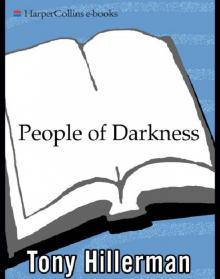 People of Darkness
People of Darkness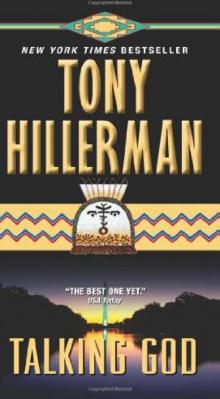 Talking God jlajc-9
Talking God jlajc-9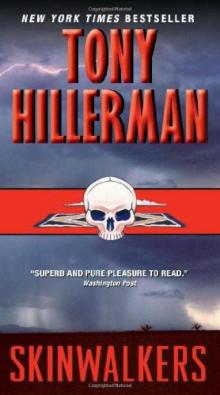 Skinwalkers jlajc-7
Skinwalkers jlajc-7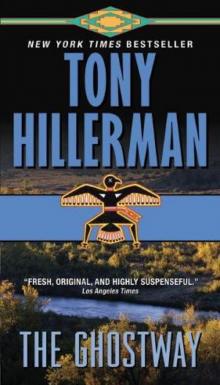 The Ghostway jlajc-6
The Ghostway jlajc-6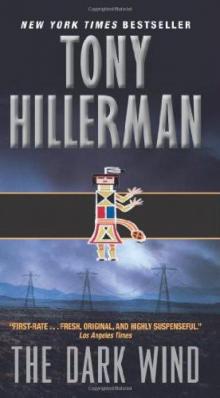 The Dark Wind jlajc-5
The Dark Wind jlajc-5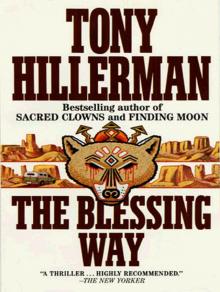 The Blessing Way
The Blessing Way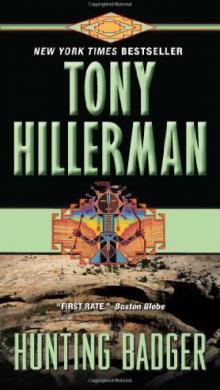 Hunting Badger jlajc-14
Hunting Badger jlajc-14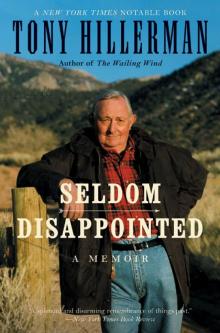 Seldom Disappointed: A Memoir
Seldom Disappointed: A Memoir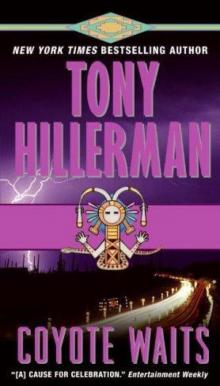 Coyote Waits jlajc-10
Coyote Waits jlajc-10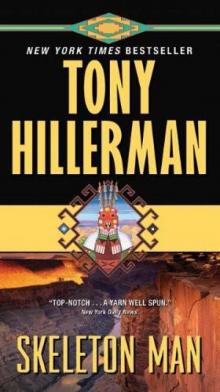 Skeleton Man jlajc-17
Skeleton Man jlajc-17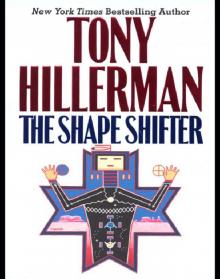 The Shape Shifter
The Shape Shifter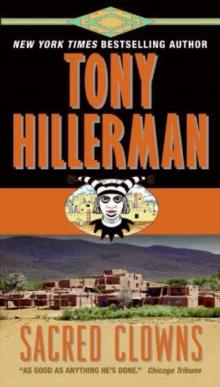 Sacred Clowns jlajc-11
Sacred Clowns jlajc-11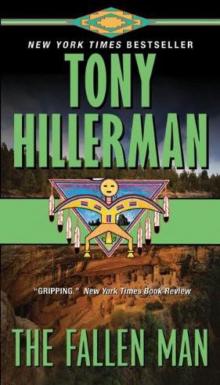 The Fallen Man jlajc-12
The Fallen Man jlajc-12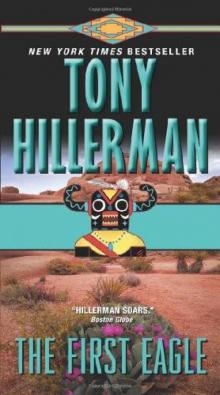 The First Eagle jlajc-13
The First Eagle jlajc-13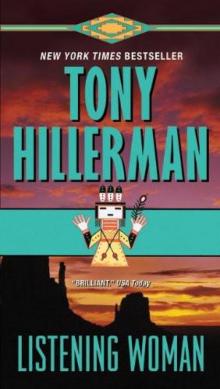 Listening Woman jlajc-3
Listening Woman jlajc-3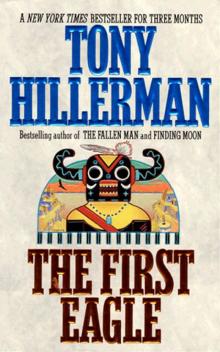 The First Eagle
The First Eagle Skeleton Man
Skeleton Man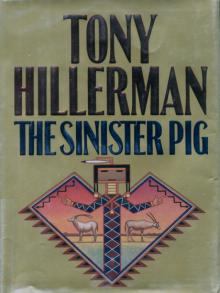 The Sinister Pig jlajc-16
The Sinister Pig jlajc-16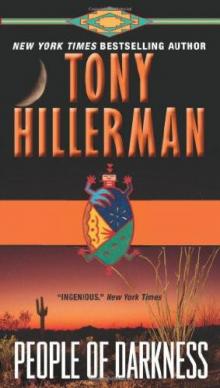 People of Darkness jlajc-4
People of Darkness jlajc-4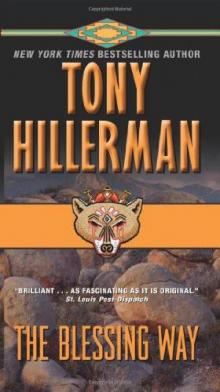 The Blessing Way jlajc-1
The Blessing Way jlajc-1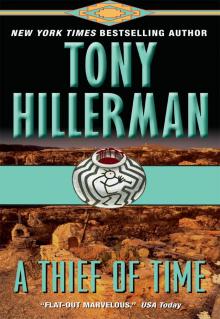 A Thief of Time
A Thief of Time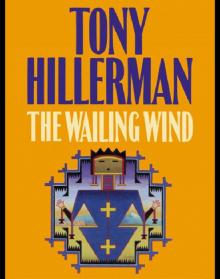 The Wailing Wind
The Wailing Wind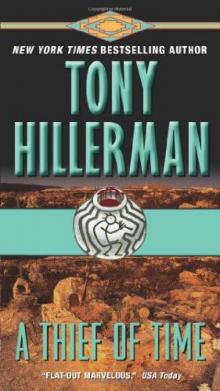 A Thief of Time jlajc-8
A Thief of Time jlajc-8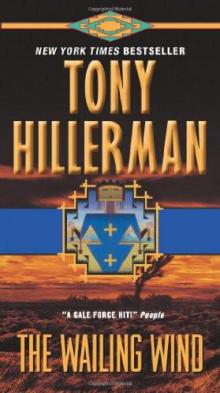 The Wailing Wind jlajc-15
The Wailing Wind jlajc-15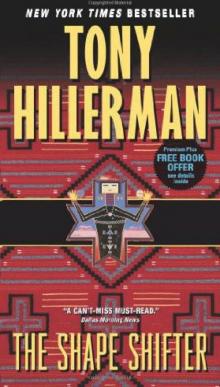 The Shape Shifter jlajc-18
The Shape Shifter jlajc-18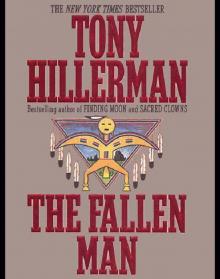 The Fallen Man
The Fallen Man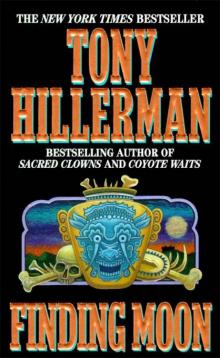 Finding Moon
Finding Moon